In Search of Adam - Reading as a Writer
Yesterday I read the rest ofIn Search of Adam, by Caroline Smailes. I say the rest of because I was up to chapter 3. I was up to chapter 3 and as a reader I was reeling. As I read on I realised that I couldn't put the book down - couldn't leave Jude in that awful, harrowing place. No siree. It is a novel with a very definite keep reading me factor. Despite the nature of the material. But it isn't my intention to to review the novel from a reader's perspective here - far greater souls have already done that effectively, efficiently, and most eloquently.
No.
I am interested in this novel from a Writer's Perspective; as a first time novelist, struggling to tell my story, whose central protagonist is, like Jude, struggling to speak to those around her. Now there is an ancient Zen Buddhist adage that goes like this;
So here 's what Caroline's novel has taught me;
- That I should be braver. I should be brave enough to tell the truth and not worry that it might be upsetting. Readers, if they care, if we can make them/help them/allow them to care, will accompany the protagonist on their journey, however painful it may be at times.
- Readers will read on through their pain, will follow the journey through to journey's end, BUT we must give them hope when they get there. Caroline's novel offers hope to the reader in a most original and refreshing way - but I mustn't spoil the ending for anyone who hasn't read it yet!
- It is okay to break the rules. Break them all. Sentence structure. Grammar. Layout. My novel is dealing with language and translation, mistranslations and communication. I have had to experiment with the portrayal of language acquisition. ISoA tells me to be free to play. Incidentally, so did Mark Haddon's The Curious Incident of the Dog in the Night - another lovely book that everyone should read.
- Endings can be beginnings. Also see Margaret Atwood's The Handmaid's Tale (1985)
- Make the reader fall in love with the protagonist. Somehow. But how????
- Allow the reader access into someone else's world. Let them experience another way of being.
- It is okay to blur the boundaries between fact and fiction - and for me this is the key point. No one has to know which bits are mine (real) and which bits are Ella's (fiction). Like Jeanette Winterson said somewhere, Art is all lies anyway. The moment we write the truth down it becomes a fiction, and in being a fiction there lies the truth of it!
- We must love and adore language whether it is as simple as Jude's at the outset of her story, or as complex and rich as Angela Carter's Bloody Chamber.
That's all from me on this rainy, grey, dull Sunday morning, while everyone else is at Glastonbury (the festival I've never made it to yet). If you haven't read In Search of Adam, I think you should. As a reader. As a writer. As a human being.


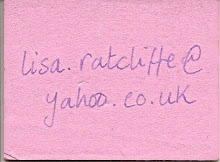







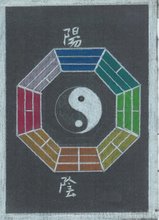
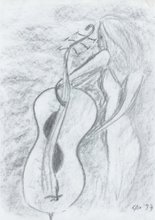
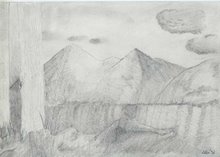
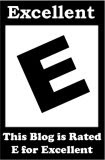








6 comments:
Amen to breaking the rules!
Did you see the rain? The course I was on was a few miles away from Glastonbury, I rather relished the sound of fat, plump rain drops battering on the library windows...
I too gained this from Caroline's novel. Particularly the point about being brave and breaking the rules. That's what I am now trying to do.
The rain is amazing - buckets of it coming down here!
As for rule breaking - and being brave - I always do this and then go back on myself - fixing things so that they conform... (sound familiar jon and jj?!) before realising that the conformed stuff is bland and souless...
BUT, we do of course need to know what the rules are before we can break them, (just in case any of my students are reading this!)
I don't believe that Art is all lies but more that language is so slippery, meaning slides from person to person, from time to time.
Re-read a book and see if you don't see something different. Ask a group to read the same book and see if they all get the same out of it.
If you want to read something really heavy on this, read Jacques Derrida Writing and Difference - I wouldn't advise it, I only did because I had to.
In summary he would say something like fiction is already invaded by fact and fact by fiction.
I've been enjoying the re-reading I'm doing (mostly for book club, but sometimes for pleasure of reading something I know I'll like, and for seeing it as a writer.) My fear is breaking the rules inadvertantly!
Jjx
Dot - Ah yes - Derrida's ickle gem. Am currently reading this for my PhD. I'm not saying it's easy - indeed it is Head Battering stuff - but I love it! Very Zen. It also ties in beautifully with quantum theory - the whole idea of what is and being and the real. Oh and Saussure. And Cixous. My brain will be pickled by the time I finish this, and guess what - it is not making writing my novel any easier at all!
JJ - in advert aunt rool braking - We'll have more of that wherever possible please!
Post a Comment